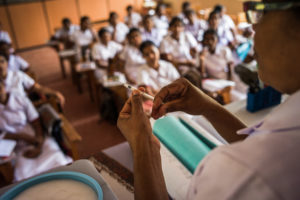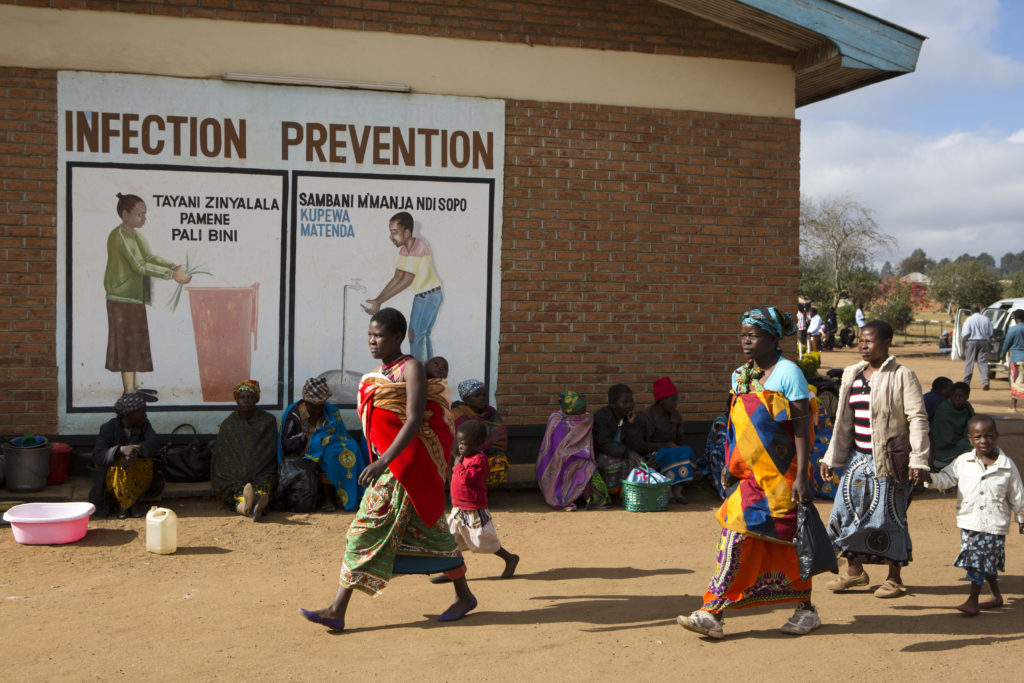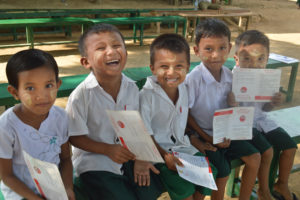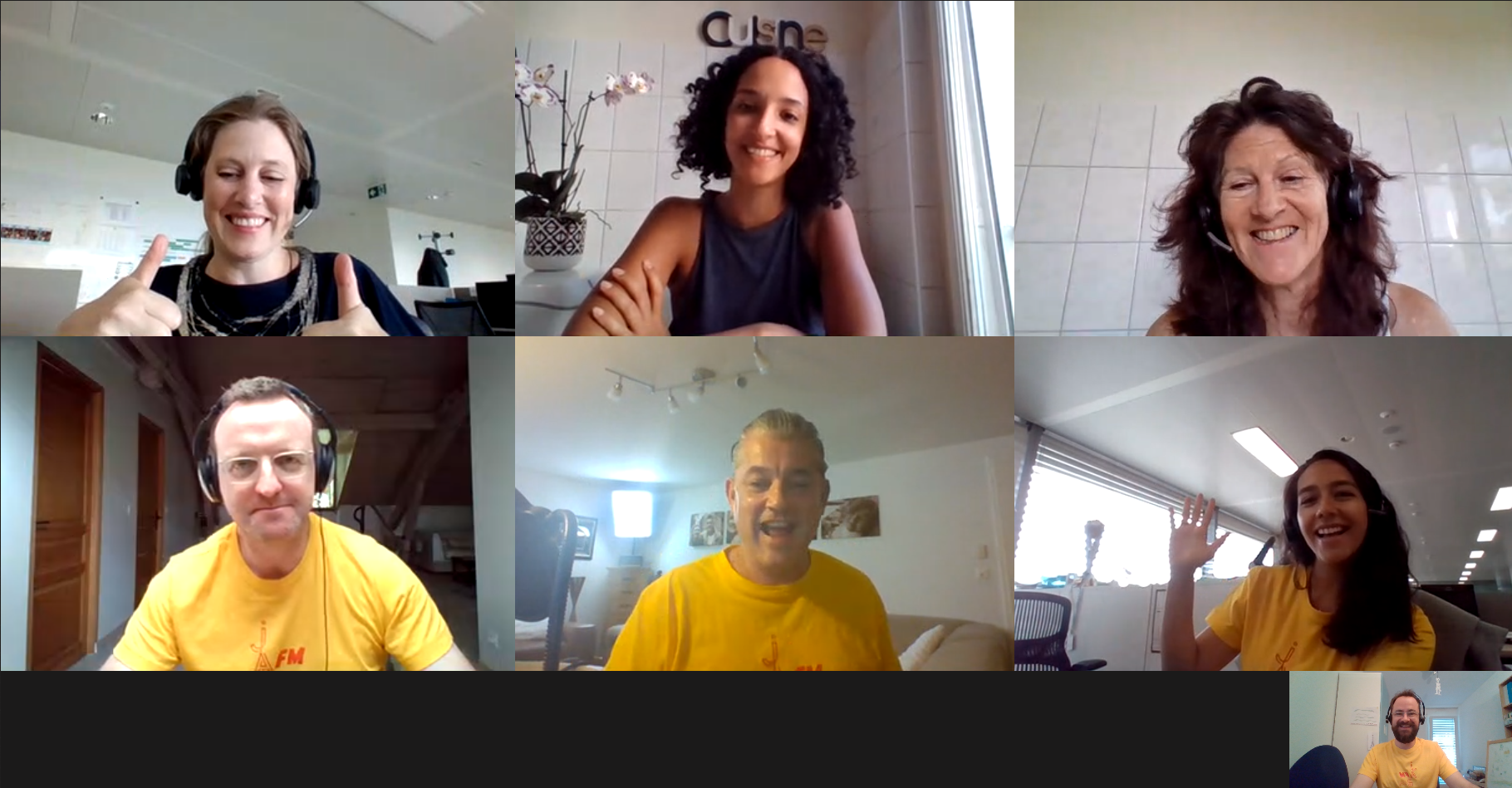On a recent Friday, the crew of Barry and Andy’s breakfast show on Jab FM radio in Geneva is entertaining listeners during another morning of coronavirus lockdown.
The episode, themed “Made in the USA,” kicks off with the James Brown song “Living in America.” Co-hosts Andy Mends and Barry Ardiff chat about the diversity in American music styles, then resident baker Shelby Lyon comes on with her cooking tip of the day, talking about a quiche she made for a friend’s wedding brunch.
Jane Mulder is next with her this-day-in-history segment, then Mends interviews guest Dave Cagen, a Seattle transplant who talks about the explosion of grunge in the 1980s and ‘90s and the city’s “spectacular” music scene during that era, which he says is still excellent, though different. The hosts play a song request for each guest, from Nirvana to Dr. Dre, and the show winds down with the crew’s collective choice: “Hotel California.”
It’s a typical episode on the Barry and Andy show, but Jab FM is not your usual radio station.
The show’s seven-member crew works for Gavi, a Geneva-based organization focused on providing vaccines for children in the world’s poorest countries. As the organization’s approximately 280 employees turned to working remotely when the coronavirus pandemic struck, Mends, Gavi’s director of operations, worried some might become isolated. He pulled together other members of Gavi’s social club, which he runs, to think about ways to help their colleagues connect.
“One of the things that really resonated with me when we were having that conversation was the power of music and the familiarity of hearing people talking,” Mends says. “So I came up with the zany idea that we do a radio station.”
It was also Mends’ idea to use Teams, Microsoft’s collaboration and chat platform, to power the show. He looked at various technologies for connecting audio to create the effect of the crew being together in a studio but found them overly complex and unstable. Instead, he uses a professional microphone that picks up audio from the hosts and guests that is streamed out of a laptop via Teams. A second laptop runs a web radio app used to mix in music and jingles.
“What a simple Teams meeting gave us was that ability to sound like we’re all in the same studio,” Mends says.
For Milena Lawrence-Samuel, Gavi’s communications and change manager, the breakfast show is a way to connect with colleagues she no longer sees around the office.
“Gavi is a really interactive and somewhat informal environment, and I love being able to walk around and have a quick chat with a friend or someone I’ve never interacted with professionally,” says Lawrence-Samuel, who does a tech tip of the day and runs a quiz question on the show.
“Those people have fallen off my radar. This is a way of getting that back. It’s a touchpoint to our colleagues that we don’t get to see every day anymore.”

Gavi helps vaccinate almost half the world’s children. Here, nurses attend a training program on vaccine and health procedures at a clinic in Sri Lanka. (Photo by Mithra Weerakone)
Jab FM (“jab” is Brit slang for an injection, a nod to Gavi’s mission) launched with its first breakfast show in late April and has so far attracted almost 5,000 listeners on every continent except South America, according to Mends. The station plays music around the clock, but the breakfast show is its only live broadcast.
The show airs Tuesday and Friday mornings and is heavily music-focused, with themes often reflecting Gavi’s diverse workforce. One episode focused on African music, with Gavi employees from African nations coming on to request songs and talk about their significance. Another episode was French-themed. Others have celebrated disco, Bollywood music and movie tunes.
The show aims not just to attract Gavi listeners, but actively engage them as guests.
“People feel when they ring in that they’re participating in something,” Mends says. “It’s that sense of community that has motivated people. But the primary purpose was really to give a bit of a lifeline and a bit of normality to those people who were feeling isolated in the beginning (of the lockdown).”
Mends even had jingles created for the show and each crew member to surprise the team. “Although it’s not a professional station, I just thought we wanted to wow people and make them feel it was a real thing,” he says.
The show is an international effort — Mends broadcasts from his basement in Perroy, a town about 15 miles from Geneva, while co-host Ardiff works from his home across the border in Ornex, France. The other crew members are scattered around the Geneva area.
A high point for the show was its live broadcast during Gavi’s Global Vaccine Summit in early June. Held every five years, the event is Gavi’s main fundraising effort, and the stakes this year were especially high.

Parents bring their children to a health center in Dedza, Malawi to be immunized against two deadly diseases, measles and rubella. (Photo by Jacques Schmitz)
The summit, attended by 52 countries, was originally to be held in London and was instead going online for the first time. Staffers wondered if vaccine funding would be a high enough priority during the global pandemic to meet Gavi’s target of $7.4 billion. Funding was needed for Gavi’s routine vaccination programs, and the organization was also launching a program to distribute an eventual COVID-19 vaccine to impoverished countries.
Nerves were running high as Mends and other Gavi employees gathered in a room at the Global Health Campus in Geneva, at desks spaced apart, to track donations and monitor the event. As Jab FM listeners tuned in, Mends interviewed colleagues to get their read on how things were going, holding a microphone attached to a length of bamboo to maintain a safe distance.
The tension was palpable as the crew waited to hear British Prime Minister Boris Johnson announce the fundraising total. As Johnson began speaking, a cheer went up and Mends jubilantly relayed the amount — a record $8.8 billion in funding for 2021 to 2025.
“$8.8 billion, Barry!” Mends tells his co-host.
“$8.8?” Ardiff says incredulously.
“$8.8!” Mends repeats.
“That is extraordinary,” Ardiff says. “I think Andy sounds like he’s going to cry.”
“No I’m not. I’m fine,” Mends says, laughing.
“That is absolutely amazing,” Ardiff says. “Brilliant.”
Though anyone could tune in to the virtual event, Mends thinks the radio show gave listeners a unique perspective.
“It portrayed a real, inside view on the emotion and tension that’s the same for a virtual event behind the scenes as it is for a physical event,” he says. “It captured the essence of why we did it, which was to bring people together so that they felt joined up even though we were all very apart.”

Children at a school in Myanmar show off their certificates after receiving a vaccination for Japanese encephalitis. (Photo by Jacques Schmitz)
Though Jab FM represents Gavi’s most innovative use of Teams, the platform has become a go-to tool for the organization in other ways. Gavi’s “demand hub,” which promotes vaccine demand and provides guidance to countries, adopted Teams so employees could work on documents together in one place and avoid endless email threads.
With Gavi partners working across different time zones and regions and on many different workstreams, online collaboration was important. When the pandemic hit, the ability to quickly share information became even more critical.
Tala Ghalayini, a digital innovation consultant for Gavi, researched various platforms and settled on Teams because it allows users to have video meetings, chat, upload documents and collaborate in one place. She used Teams to create a channel where partners in various countries can add links and updates on their regions. While some employees were initially reluctant to adopt a new application, she says, the pandemic changed that.
“Because COVID is so fast-moving and every day there’s so much happening so quickly in so many different places, it’s hard to keep up,” says Ghalayini.
“And this is where Teams comes in, because it’s easy to quickly share a guidance note or an in-country survey that could be useful to somebody. I think this is where Teams really did catalyze the movement to using it more rigorously. I’m shocked by how quickly it’s taken off.”
Gavi’s office culture might be informal, but its work is a somber business. Since launching in 2000, the organization and its partners have helped vaccinate more than 760 million children from infectious diseases, preventing an estimated 13 million-plus deaths.

Polio vaccinators in India, where the disease has been eradicated, immunize children wherever they are — in cities, remote regions and transit stations. (Photo by Manpreet Romana)
Before the pandemic, Gavi employees were expected to report to the office. A formal work-from-home culture didn’t exist. Suddenly, employees had to figure out a way to work remotely without slowing down the organization’s critical work. Gavi had access to Teams but hadn’t rolled it out officially or trained employees to use it. Yet during the first week of remote work, Gavi employees held more than 830 meetings and more than half were on Teams.
“People figured out really quickly that it was a great way to meet online,” says Cagen, the former Seattleite who is the senior manager of Gavi’s monitoring and evaluation team. “It’s suddenly had this boom of activity.”
The informal nature of remote work and video meetings — kids popping up in backgrounds, pets making random appearances — has brought a newfound levity to Gavi, employees say. Cagen’s group launched a “fun channel” on Teams where they’ve posted photos of their dogs, traded tips on traveling in Switzerland and held a happy hour during which they walked around with their phones and laptops, showing each other their apartments.
“Until lockdown, you didn’t see everyone’s inner workings,” Cagen says. “Now I know that Milena has the really cool kitchen.”
Ghalayini recalls an early Teams meeting when her manager set her background to one with bouncing balls, to her amusement.
“We do serious business and it’s hard to inject some fun, especially amidst the crisis, but it was very humorous,” she says. “Even just seeing that, it felt like a cultural shift. Other people were uploading sunsets in the background, and beaches, and it was really funny.”
As for the Barry and Andy show, Mends hopes it will go on even after Switzerland continues to move out of lockdown.
“It has opened up another channel of communication with staff and an opportunity for us to connect in a different way,” he says. “It’s quite a unique thing to the organization. I think it would be sad to see it go completely.”
Top photo: The Jab FM crew is all smiles during a recent episode of Barry and Andy’s breakfast show. Clockwise from top left: Shelby Lyon, Milena Lawrence-Samuel, Jane Mulder, Maria Isabella Paez, Andy Mends, Barry Ardiff. Bottom row: Rod Abson. (Photo courtesy of Gavi). Audio segment produced by Sara Lerner.“


